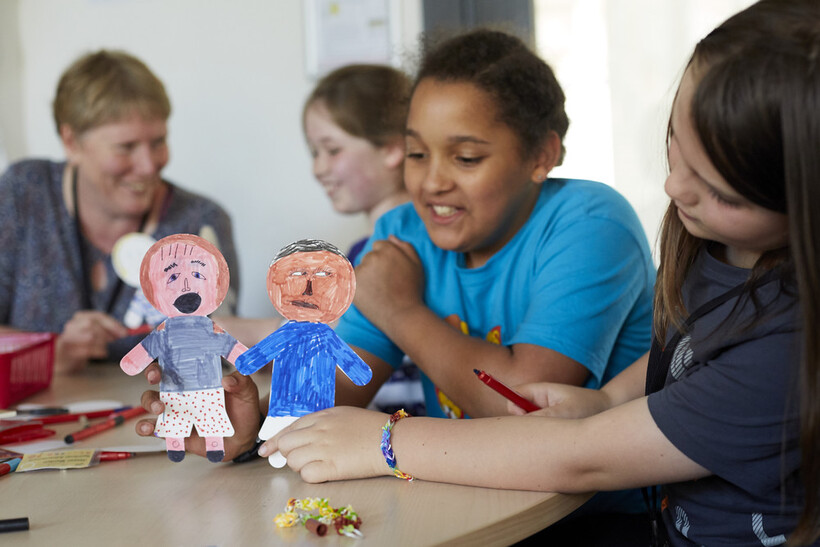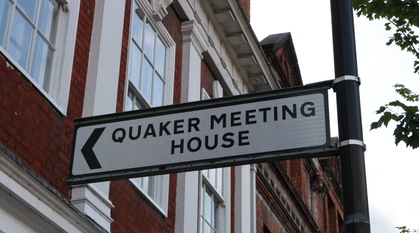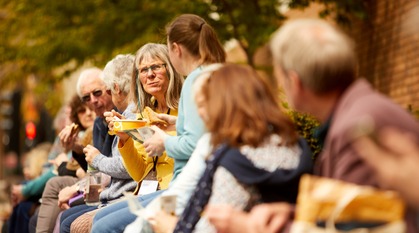Our faith, our community: a reality check for 2020
As a turbulent new year begins, Paul Parker looks at the current state of British Quakerism through three different lenses – and finds hope for the future.

As we begin a new decade, how are we doing? What are the challenges and opportunities for us as Quakers?
Well, it all depends what lens you're looking through. I've chosen three for this blog: our organisation and structures, our Quaker community, and the world around us.
The world around us
First, the reality of the world around us. The world faces multiple linked emergencies this year. The unfolding climate emergency is deepening. Governments dither and delay while those already affected for decades remain unheard; levels of social and economic inequality are at record levels; and violence and war remain our default recourse to conflict.
These factors are driving a migration crisis, a fracturing of communities in our own society here in Britain, a polarised political culture, and a frightening rise in militarism and trade in arms.
There is opportunity here, though. People of good faith are organising, campaigning and disrupting with fresh vigour. The voice of young people, through the climate strike movement, is being listened to, even though true action is yet to come. British climate activists, Quakers among them, are galvanising themselves to make a big noise, and – much more importantly – a big difference, as the UK hosts the COP26 climate talks in Glasgow in November 2020.
In the face of the 'hostile environment', nearly 100 Quaker Sanctuary Meetings offer welcome, practical and financial support, and an important sense of accompaniment to people arriving in this country.
Underpinning our work in these areas is the fundamental insight that, if we are faithful to the promptings of love and truth in our hearts, we can answer that of God in all. This is, in other language, the Christian commandment to love one another.
Our Quaker community
Our Quaker community is also in a time of change. The balance between large and small meetings is shifting, as large meetings become rarer, and small ones more common. Some meetings are struggling to adapt to this change, with fewer people to fill all the roles.
Our demographic is changing too. Most Quakers now come to us for the first time as adults, and many are the only Quaker in a household. Many Quaker meetings are not providing regular activities for children and young people, meaning not just children, but also parents, are excluded. Being a Quaker is, in many places, no longer a family activity.
The diversity of the community around us is not often well-reflected in our own meetings. Despite efforts to be welcoming and inclusive, we can still have blocks, including recognising our own privilege and – dare I say – a lack of openness to the insights people bring from elsewhere. Too many people have still never heard of Quakers, and we are not as confident as we should be at explaining the Quaker way to seekers.
Yet here too there is hope. Although attendance at Sunday meetings may be falling, social media allows people to engage with the Quaker experience online, and new virtual communities are forming here. Young adult groups are springing up, finding support, and thriving.
The Vibrancy in Meetings experiment has shown that even small offers of support and loving accompaniment can enable struggling Quaker meetings to find their feet again, and thrive. In a new partnership, Britain Yearly Meeting and Woodbrooke are shifting our understanding about how to put meetings' needs at the centre of how we support Quaker communities, and the 300-year-old London-centric approach is at last changing as BYM prepares to pilot a new hub outside the capital.
New trials with regional Quaker youthwork are showing that young people will engage if we find the right ways to work with them. Our Yearly Meeting Gathering, from 1–7 August at the University of Bath, will be a huge intergenerational event, this year exploring the theme Listening, prophecy and reconciliation: allyship in a climate emergency – a title chosen by our young people, and laid before our Yearly Meeting to challenge us all.
Our shared recognition that meeting for worship is the bedrock of living as a Quaker, and that it is a thing to be treasured, nurtured and shared, is the key to the work we need to do in this area. The beautiful simplicity of our way of worship shines through, despite the complexity we, as humans, manage to surround it with.
Organisations and structures
Finally, there is the reality of our 350-year-old organisation and structures. Set up to ensure the sustainability of the nascent movement in the mid-17th century, and adapted over the years, it may be time to reform them again in response to the demands of the 21st century.
In today's highly-regulated environment our reliance on volunteers to ensure we are well-administered, charity-law compliant, and safe may not be sustainable. At a national level, around five hundred Friends are engaged with the governance of the centrally-managed work of Britain Yearly Meeting – is sitting in committee meetings the best use of their gifts, or are there new and creative ways for their willingness to serve to be expressed?
Friends' giving to Britain Yearly Meeting, both of time and of money, will need to change – the investment BYM is making towards becoming a simple church, supported by a simple charity to reinvigorate Quakerism can be afforded in the short term from reserves, but we need to reach a new sustainable position within the next couple of years.
Movement is happening in these areas too. A committee has set to work on updating our book of discipline, Quaker faith & practice, for a new generation of Quakers.
Meetings all over Britain are beginning to talk about simplifying structures and reducing the demands on their members. We are learning how to use our still quite-new area meeting trustee bodies to take on the work which is burdensome for our meetings. Britain Yearly Meeting's committees are gradually being simplified and barriers to more diverse membership being removed, and BYM's staff are working together in new and more integrated ways.
As William Charles Braithwaite says, “the life of a religious society consists in something more than the body of principles it professes and the outer garments of organisation which it wears … [it is] to be found in the vital union of the members of the Society with God and with one another, a union which allows the free flowing through the society of the spiritual life which is its strength" (Quaker faith & practice 10.04).
Whatever your take on the new reality revealed through these three lenses, there is work of us all to do here. I wish you a happy, and hopeful, New Year!


